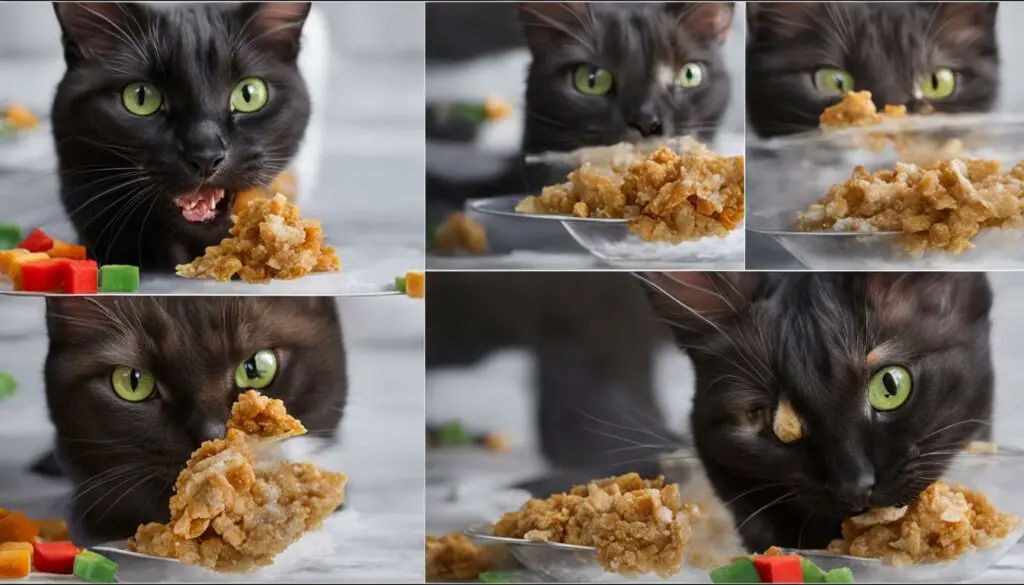As a cat owner, it’s concerning when our furry friends experience digestive issues, especially when it comes to the treats we give them. One brand that has raised eyebrows in this regard is Temptations cat treats. There have been reports of cats vomiting after consuming these treats, leaving us to wonder about their safety and potential impact on our cats’ well-being.
Key Takeaways:
- Temptations cat treats have been reported to cause vomiting in some cats.
- There is a debate about whether cat treats are beneficial or harmful for cats.
- Overfeeding cats with treats can lead to obesity and digestive problems.
- It is important to provide treats in moderation and consider a cat’s nutritional needs.
- Consulting a veterinarian is crucial for personalized advice regarding cat treat consumption and any concerns about vomiting.
Are Cat Treats Good For Cats?
When it comes to cat treats, there is an ongoing debate about whether they are beneficial or harmful for our feline friends. While treats can be a tasty incentive for good behavior, it’s important to consider their potential impact on a cat’s overall health.
One concern is that cat treats can contribute to weight gain. Just like humans, cats can become overweight or obese, which can lead to various health issues, including diabetes and joint problems. It’s essential to monitor the calorie intake from treats and ensure they don’t exceed more than 10% of a cat’s daily calorie requirement.
Another consideration is the potential for allergic reactions. Some cats may have food allergies or sensitivities that can cause digestive problems and vomiting. It’s essential to be mindful of the ingredients in cat treats and avoid those that may trigger an allergic reaction in your furry friend.
While treats can be a delightful way to bond with your cat and reward them for good behavior, it’s crucial to choose high-quality options that are specifically formulated for cats and meet their dietary needs.
To ensure your cat’s well-being, consult with a veterinarian who can provide personalized advice based on your cat’s health, dietary needs, and potential sensitivities. They can recommend suitable treats that are both enjoyable and safe for your feline companion.
Are Cat Treats Good For Cats?
There are advantages and disadvantages to giving cat treats, and it’s important to strike a balance. Here is a brief overview of the pros and cons:
| Pros | Cons |
|---|---|
|
|
Remember, moderation is key. Treats should be given sparingly and should never replace a balanced diet. By choosing the right treats and monitoring portion sizes, you can ensure that your cat enjoys a delicious reward without compromising their health.
Too Many Treats Leads To Obesity In Cats
Feeding our furry friends treats is undoubtedly a joyous experience, but it’s crucial to be mindful of the quantity we provide. Overindulging cats with an excess of treats can lead to obesity, resulting in various health complications, including digestive problems and vomiting.
Cats have specific caloric needs based on their weight and activity levels, and treats should account for no more than 10% of their daily calorie requirement. Exceeding this limit can disrupt the delicate balance of their regular diet, leading to nutrient imbalances and gastrointestinal sensitivity.
To ensure our cats maintain a healthy weight and digestive system, it’s important to practice moderation when offering treats. By closely monitoring the frequency and portion sizes, we can prevent the onset of obesity-related issues and maintain our feline companions’ overall well-being.
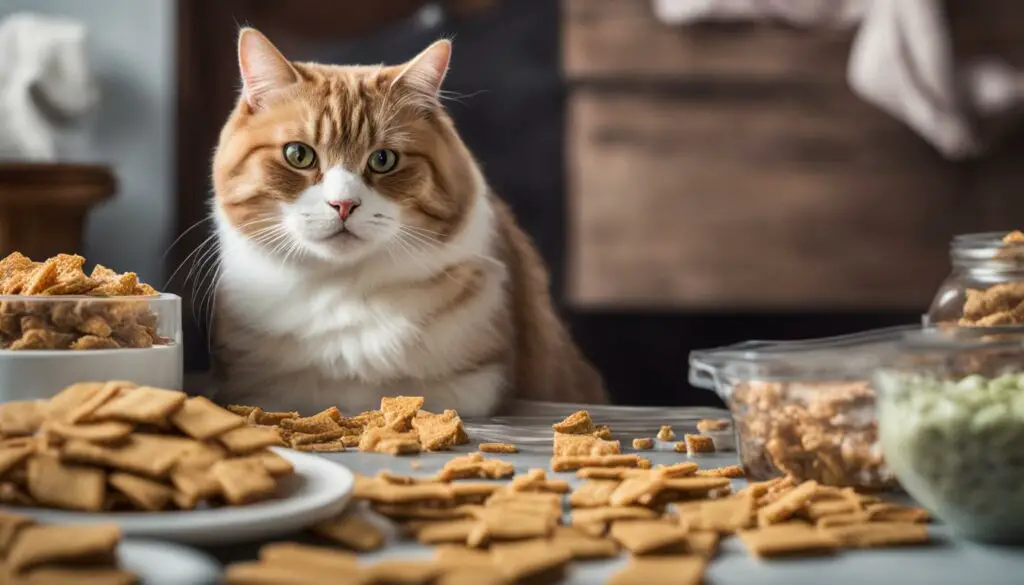
The Importance of Balanced Nutrition
“Obesity in cats is a growing concern and can have severe consequences on their health. It’s essential to prioritize a balanced diet that meets their nutritional needs instead of relying solely on treats. Obesity not only leads to digestive problems but also increases the risk of diabetes, arthritis, and heart disease.” — Dr. Emily Thompson, DVM
A balanced diet for cats consists of high-quality, protein-rich cat food that fulfills their carnivorous dietary requirements. Temptations cat treats, while enjoyable for our feline companions, are meant to be supplemental and should not replace a complete and balanced meal. Providing a variety of nutritious cat food options alongside the occasional treat ensures that our cats receive all the essential nutrients they need to thrive.
| Treat Type | Portion Size | Frequency |
|---|---|---|
| Chicken-flavored treats | 3-4 pieces | Once daily |
| Fish-flavored treats | 2-3 pieces | Every other day |
| Other flavored treats | 1-2 pieces | 2-3 times per week |
Remember, each cat is unique, so it’s essential to consult with a veterinarian before implementing any changes to their diet. They can provide personalized guidance and recommendations based on your cat’s specific needs and dietary restrictions. Together, we can ensure our furry friends enjoy their treats while maintaining optimal health and happiness.
Is It Ok To Give Your Cat Treats Every Day?
As a responsible cat owner, you may be wondering if it’s safe to give your furry friend treats every day. While treats can be a tasty way to reward and bond with your cat, it’s important to consider the potential risks and maintain a balanced approach to treat-giving.
Feeding your cat treats every day in moderation is generally acceptable. However, it’s crucial to limit their daily intake to no more than 10% of their calorie requirement. This ensures that treats don’t make up a significant portion of their diet and that they are still receiving essential nutrients from their regular meals.
Excessive consumption of treats can lead to health issues like obesity and nutritional imbalances. It’s essential to strike a balance between providing your cat with a tasty reward and maintaining their overall well-being. Monitoring your cat’s weight and consulting with a veterinarian can help you determine the right amount of treats for your feline friend.
Factors to Consider When Giving Your Cat Treats:
- Caloric Content: Different cat treats have varying caloric values. Check the packaging or consult with your veterinarian to ensure you’re not exceeding your cat’s daily calorie limit.
- Ingredients: Opt for high-quality treats made with wholesome, cat-friendly ingredients. Avoid treats with excessive additives, fillers, or potential allergens that may cause digestive problems.
- Health Conditions: If your cat has any underlying health conditions, such as obesity or allergies, it’s important to choose treats that align with their specific needs, as advised by your veterinarian.
Remember, treats should be given as a supplement to a complete and balanced diet. Providing your cat with a variety of treats in moderation can contribute to a happy and healthy feline companion.
| Treat Type | Calories per Serving | Recommended Serving Size |
|---|---|---|
| Crunchy Treats | 5-10 calories | 1-2 treats |
| Soft Treats | 10-15 calories | 1 treat |
| Freeze-Dried Treats | 1-2 calories | 5-10 treats |
Always remember to provide fresh water for your cat alongside their treats, as hydration is essential for their overall health. By being mindful of portion sizes, ingredients, and your cat’s specific needs, you can enjoy the joy of treating your feline companion without compromising their well-being.
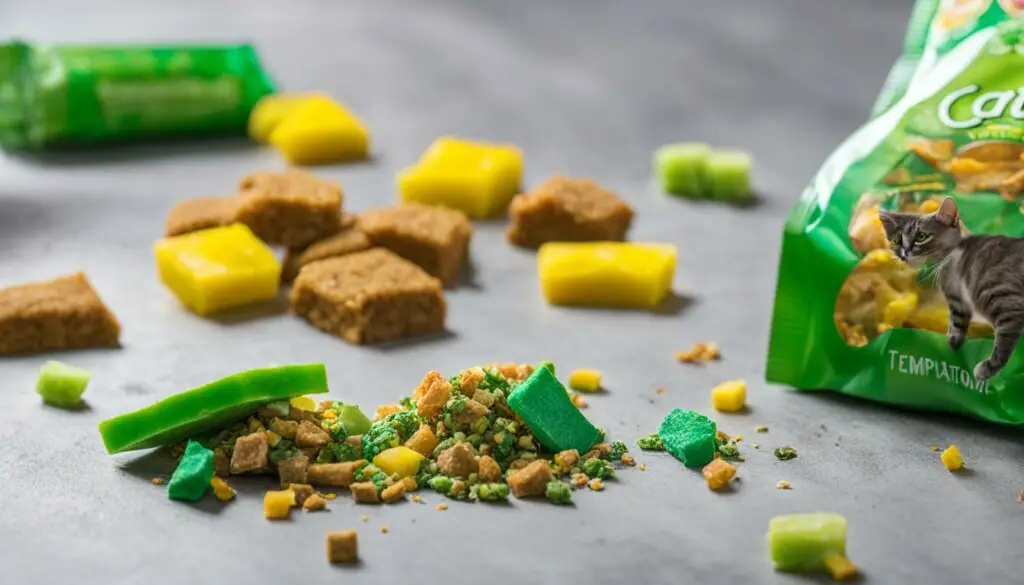
How Many Temptations Treats Should I Give My Cat A Day?
When it comes to feeding our cats treats, it’s important to find the right balance. Temptations treats are a popular choice among cat owners, but how many should you give your cat each day? The answer depends on your cat’s body weight. It is generally advised to provide up to 15 treats per 10 pounds (4.5 kg) of body weight per day. However, it’s crucial to remember that excessive consumption of Temptations treats can lead to digestive issues in cats.
It’s essential to pay attention to your cat’s overall calorie intake when offering treats. The daily intake of Temptations treats should not exceed 10% of your cat’s total calorie requirement. This ensures that your cat receives a balanced diet and avoids potential health problems such as obesity or nutrient imbalances.
When giving your cat Temptations treats, moderation is key. While these treats can be a tasty and enjoyable reward, it’s important not to overindulge. Always monitor your cat’s weight and overall health to ensure that they are not experiencing any adverse reactions to the treats. If you notice any digestive problems or vomiting after giving your cat Temptations treats, it’s best to consult with your veterinarian for guidance.
| Cat’s Body Weight | Number of Temptations Treats |
|---|---|
| 5 pounds (2.3 kg) | 7-8 treats |
| 10 pounds (4.5 kg) | 15 treats |
| 15 pounds (6.8 kg) | 22-23 treats |
Temptations™ Cat Treats: A Treat Or A Meal?
Temptations cat treats are a popular choice among cat owners for rewarding their feline friends. However, it’s important to understand that these treats should be considered as an occasional indulgence, rather than a substitute for a balanced meal. While cats may enjoy the taste of Temptations treats, they may not provide the necessary nutrition that cats require from their regular diets.
Excessive consumption of Temptations treats can lead to digestive problems and other health issues in cats. It’s crucial to maintain moderation when it comes to treating your cat, ensuring that their overall diet is well-balanced and meets their nutritional needs. Consult with your veterinarian for guidance on the appropriate amount of treats to give your cat based on their individual dietary requirements.
Remember, cats are obligate carnivores, which means their diet should primarily consist of animal-based proteins. While Temptations treats may be a tasty incentive for your cat, it’s essential to prioritize their health and well-being by providing them with a nutritionally complete and balanced diet as the foundation of their meals.
Key Takeaways:
- Temptations cat treats should be given to cats in moderation as an occasional treat, not as a meal replacement.
- Excessive consumption of Temptations treats can lead to digestive problems and other health issues.
- Consult with your veterinarian to determine the appropriate amount of treats to give your cat based on their individual needs.
- Always prioritize a balanced diet that is rich in animal-based proteins for your cat’s overall health and well-being.
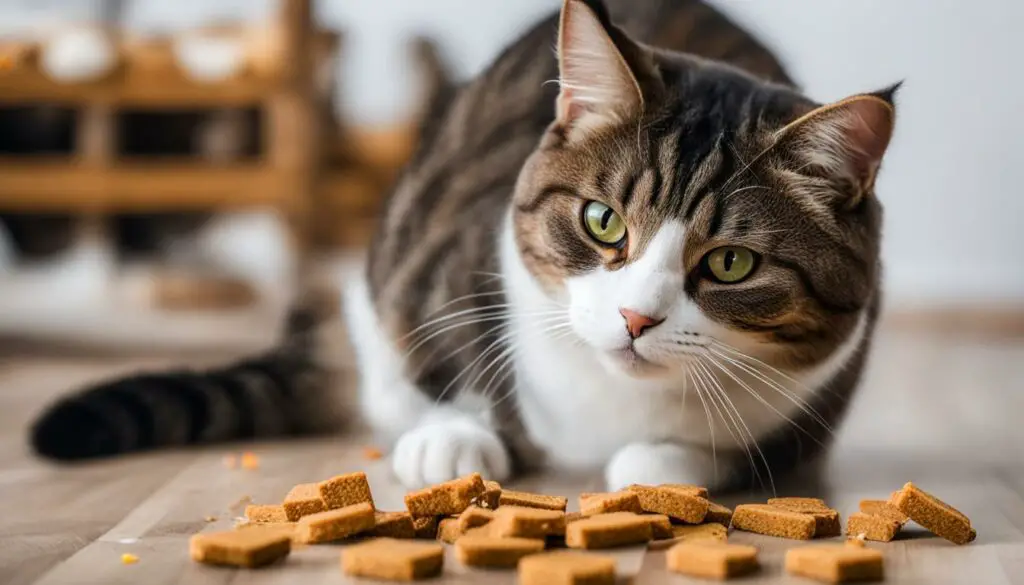
Can Cats Eat Tortilla Chips?
As a cat owner, you may be tempted to share your favorite snacks with your feline companion. However, when it comes to tortilla chips, it’s best to resist that temptation. Tortilla chips and other human snacks are not recommended for cats as they can cause digestive issues, including vomiting. Cats have different nutritional needs and may react negatively to the ingredients in human food, such as the salt and additives found in tortilla chips.
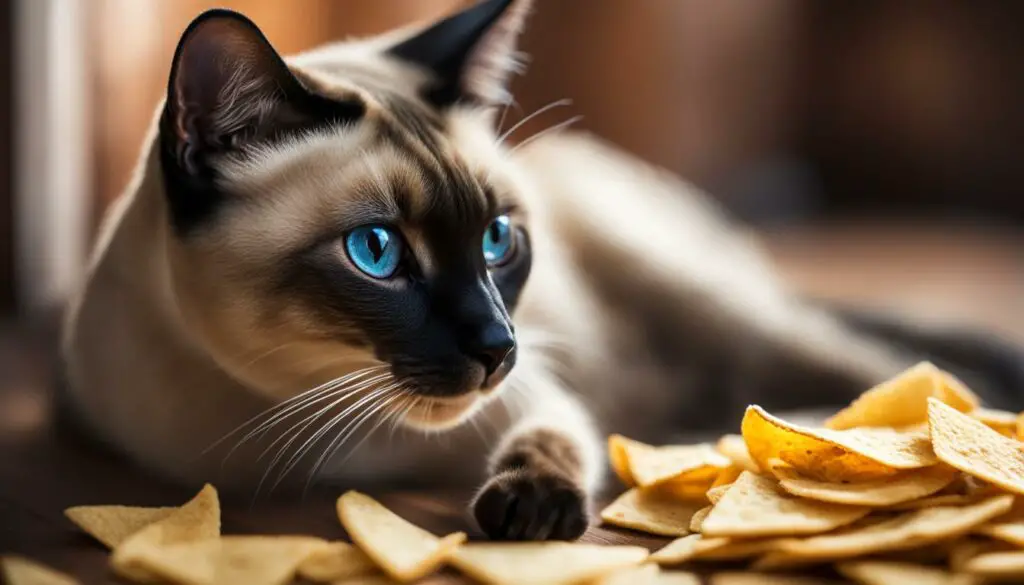
While corn is the primary ingredient in tortilla chips, which can be challenging for cats to digest, it is the seasonings and additives that pose a potential risk to their digestive system. The high salt content in tortilla chips can also lead to vomiting and other health complications in cats. It’s important to remember that cats are obligate carnivores, meaning their diets should primarily consist of animal-based proteins.
If you’re considering sharing tortilla chips with your cat, it is crucial to opt for plain, unseasoned varieties to reduce the risk of exposing your cat to harmful additives or seasonings. However, even plain tortilla chips should be given in moderation. It’s important to closely observe your cat for any reactions or changes in behavior after introducing new foods. If you notice any vomiting or digestive problems, it’s best to consult with a veterinarian for guidance.
Key Points:
- Cats should not be given tortilla chips or other human snacks.
- Tortilla chips can cause digestive issues and vomiting in cats.
- Cats require a diet primarily consisting of animal-based proteins.
- If you choose to share tortilla chips with your cat, opt for plain, unseasoned varieties and give them in moderation.
- Consult a veterinarian if you have any concerns about your cat’s diet or if you notice any adverse reactions.
Table: Comparison of Tortilla Chips and Cat Treats
| Tortilla Chips | Cat Treats | |
|---|---|---|
| Taste | Savory, often salty | Variety of flavors, specifically formulated for cats |
| Ingredients | Corn, oil, seasonings | Animal-based proteins, carbohydrates, vitamins, and minerals |
| Nutritional Value | Low in beneficial nutrients, high in salt and unhealthy fats | Formulated to provide necessary nutrients for cats |
| Digestibility | Challenging for cats due to corn and seasonings | Specifically formulated for easy digestion by cats |
| Potential Effects | Can cause digestive issues and vomiting in cats | May contribute to weight gain if given in excess, but designed for feline consumption |
Understanding a Cat’s Diet: Carnivorous Essence
Cats are unique creatures with specific dietary needs. As obligate carnivores, their bodies have evolved to thrive on a diet primarily consisting of animal-based proteins. This means that their nutritional requirements differ significantly from those of humans. To ensure the health and well-being of our feline companions, it is essential to understand the essence of their carnivorous nature and provide them with a balanced diet that aligns with their biological needs.
A cat’s digestive system is specifically designed to process and absorb nutrients from animal proteins efficiently. Unlike humans, cats have a limited ability to break down and utilize nutrients from plant-based sources. Their bodies require essential amino acids, such as taurine and arginine, which are found in abundance in animal tissues. These amino acids are vital for various physiological functions, including heart health, vision, and reproduction.
Feeding cats a diet rich in high-quality animal proteins helps ensure that they receive the necessary nutrients to support their overall health and prevent deficiencies. It is crucial to choose cat food that lists real meat as the primary ingredient and provides a complete and balanced profile of essential nutrients. Additionally, incorporating occasional treats that align with a cat’s carnivorous essence can be an enjoyable way to provide enrichment and reward good behavior. However, it is important to choose treats that are specifically formulated for cats and avoid excessive consumption to prevent digestive issues such as vomiting.
| Nutritional Needs of Cats | Examples of Suitable Foods |
|---|---|
| Animal-based proteins | Chicken, turkey, beef, fish |
| Taurine | Poultry, organ meats |
| Essential fatty acids | Salmon, sardines, fish oil |
| Vitamins and minerals | Fortified cat foods |
“Cats are natural carnivores, and their dietary needs should reflect their evolutionary heritage. Providing them with a diet rich in animal-based proteins is essential for their overall health and well-being.” – Dr. Emily Rodriguez, DVM
Tortilla Chips: Unveiling Nutritional Components
When it comes to understanding the potential impact of tortilla chips on cats, it is essential to delve into their nutritional components. Tortilla chips are primarily made of corn, oil, and seasonings, which can have varying effects on our feline friends. While corn can be challenging for cats to digest, it is the seasonings and additives that pose a potential risk to their digestive system. The high salt content in tortilla chips can lead to vomiting and other health complications in cats.
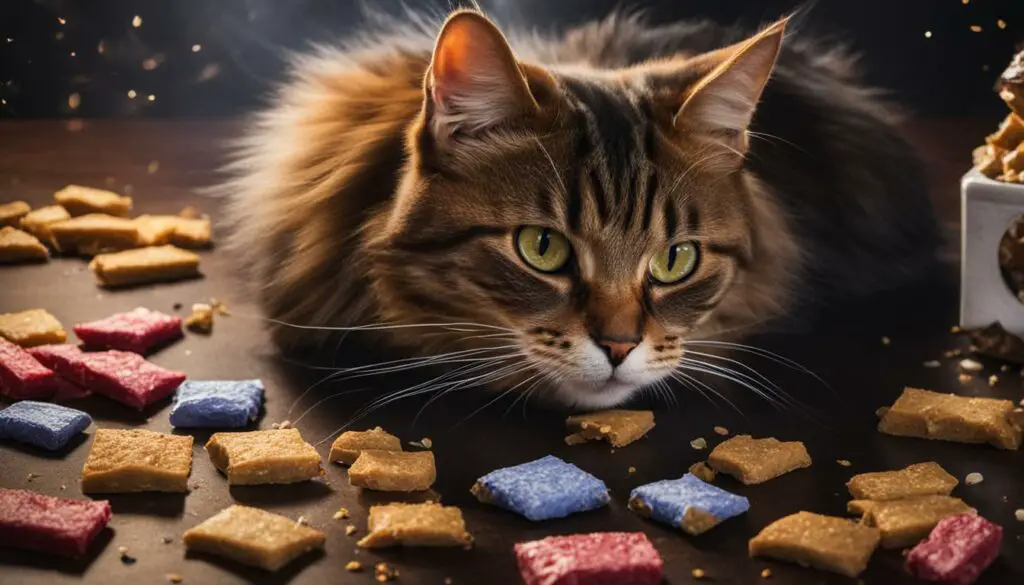
Table: Nutritional Components of Tortilla Chips
| Nutritional Component | Potential Impact on Cats |
|---|---|
| Corn | Challenging to digest for cats |
| Salt | High sodium content can lead to vomiting and other health complications |
| Seasonings and additives | Potential risk to a cat’s digestive system |
When cats consume tortilla chips, they may experience gastrointestinal discomfort and potentially vomit due to their sensitive digestive systems. It is important for cat owners to be aware of the potential risks associated with feeding tortilla chips to their feline companions.
While it may be tempting to share human snacks with our cats, it is crucial to prioritize their nutritional needs. Opting for cat-specific treats that are designed to meet their dietary requirements is a safer alternative to ensure their well-being. Consulting a veterinarian for personalized advice is always recommended to address any concerns about digestive problems or vomiting related to cat treat consumption.
Can Cats Eat Tortilla Chips? Weighing Safety and Considerations
While sharing snacks with our furry friends may seem like a fun idea, it is important to consider the potential risks and health implications for cats. When it comes to tortilla chips, caution should be exercised. Tortilla chips are not recommended for cats due to the high salt content and potential digestive challenges they pose.
“Cats have a low tolerance for sodium, and consuming salty foods can lead to dehydration, kidney issues, and other health complications.”
Cats have specific dietary requirements, and their bodies are not designed to handle the ingredients commonly found in human snacks. The high salt content in tortilla chips can lead to dehydration and kidney issues in cats, which can be serious and potentially life-threatening. Additionally, the corn ingredient in tortilla chips can cause gastrointestinal discomfort and digestive problems in cats.
It is essential to prioritize the health and well-being of our feline companions by providing them with a balanced diet that meets their nutritional needs. If you are looking for alternative treats to offer your cat, there are various cat-specific treats available on the market that are formulated to be safe and nutritious for feline consumption. It is always best to consult with a veterinarian for personalized advice regarding cat treats and any concerns about vomiting or digestive problems.
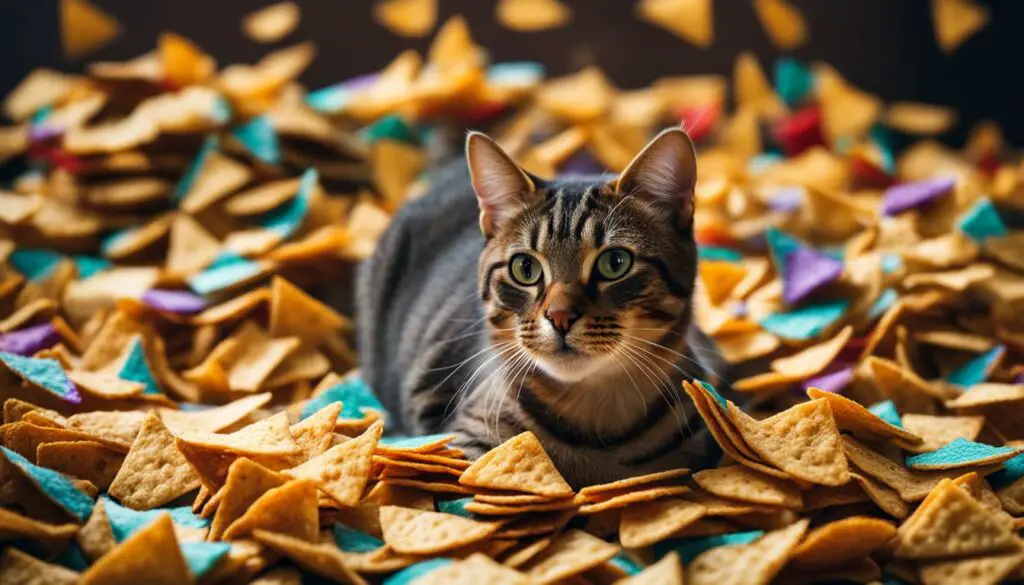
Weighing Safety and Considerations
| Tortilla Chips | Cats |
|---|---|
| High salt content | Low tolerance for sodium |
| Potential digestive challenges | Specific dietary requirements |
| Dehydration and kidney issues | Gastrointestinal discomfort |
Considering the potential risks and health implications, it is best to avoid giving tortilla chips to your cat. Instead, opt for cat-specific treats that are specifically formulated to meet their nutritional needs. By prioritizing their health and well-being, you can ensure that your feline friend remains happy and healthy.
Introducing Tortilla Chips to Cats: A Careful Approach
When it comes to sharing human food with our furry friends, it’s important to exercise caution and consider their unique dietary needs. While it may be tempting to share a snack like tortilla chips with your cat, it’s crucial to approach with care. Tortilla chips can potentially cause digestive problems in cats, including vomiting. To ensure the safety of your feline companion, here are a few guidelines to follow when introducing tortilla chips to cats.
First and foremost, it’s essential to opt for plain, unseasoned tortilla chips. Many flavored varieties contain additives like onion, garlic, or excessive salt, which can be harmful to cats. These ingredients can irritate their digestive systems and lead to vomiting or other gastrointestinal issues. By choosing plain tortilla chips, you can minimize the risk of exposing your cat to potentially harmful substances.
Additionally, it’s crucial to practice moderation when sharing any new food with your cat, including tortilla chips. Introduce the chips gradually and in small quantities. Observe your cat for any signs of discomfort, such as vomiting, diarrhea, or changes in behavior. Every cat is unique, and some may have more sensitive stomachs than others.
Remember, tortilla chips should never replace a balanced diet for your cat. While they may enjoy the occasional treat, they do not provide the necessary nutrition cats require from their regular diets. It’s crucial to prioritize a well-balanced commercial cat food that meets all their nutritional needs. If you have concerns about your cat’s diet or digestive health, it’s always best to consult your veterinarian for personalized advice.
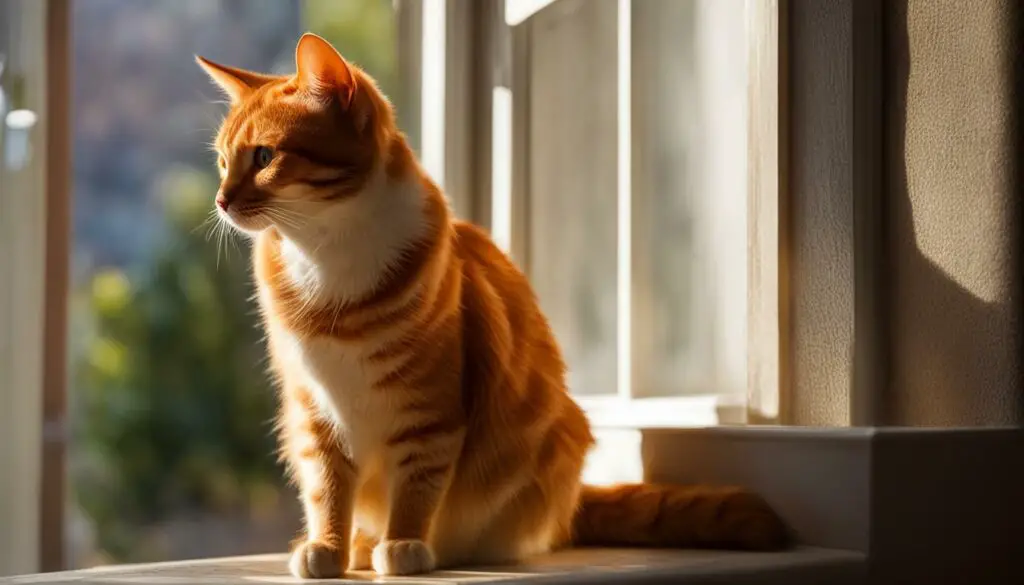
Table: Potential Risks of Tortilla Chips for Cats
| Potential Risk | Description |
|---|---|
| Seasonings and Additives | Tortilla chips often contain seasonings and additives that can upset a cat’s digestive system, leading to vomiting or gastrointestinal discomfort. |
| High Salt Content | The excessive salt found in many tortilla chips can be detrimental to a cat’s health, potentially leading to dehydration, kidney issues, or other health complications. |
| Corn Ingredient | Cats have difficulty digesting corn, a primary ingredient in tortilla chips. This can cause gastrointestinal distress and contribute to digestive problems. |
In conclusion, while it may be tempting to share tortilla chips with your cat, it’s important to approach this snack with caution. Opt for plain chips, practice moderation, and prioritize a balanced cat food diet for your feline companion. By following these guidelines, you can help ensure the well-being and digestive health of your beloved cat.
Consulting a Veterinarian: Expert Insights Matter
When it comes to the health and well-being of our beloved cats, seeking the advice of a veterinarian is of utmost importance. Veterinarians are trained professionals who can provide expert insights and personalized guidance based on the specific needs of your feline friend. Whether you have concerns about cat treats causing vomiting, cat food allergies, or digestive problems related to treat consumption, a veterinarian can offer invaluable support and assistance.
A veterinarian will take into account your cat’s unique health status, dietary requirements, and potential sensitivities when providing recommendations. They can help you navigate the complex world of cat treats and ensure that you make informed choices that prioritize your cat’s health. By consulting a veterinarian, you can gain peace of mind and confidence in the decisions you make regarding your cat’s diet and treat consumption.
Furthermore, a veterinarian can conduct a thorough examination to identify any underlying health issues that may be contributing to vomiting or digestive problems. They can perform diagnostic tests, such as allergy testing, to determine if your cat has any specific food allergies that may be triggered by certain treats. With their expertise, they can help you develop a comprehensive plan to address and manage these issues effectively.
Expert Insight: Dr. Emily Collins, DVM
“As a veterinarian, I always encourage cat owners to consult with me when it comes to their cats’ diets and treat choices. Every cat is unique, and what works for one cat may not be suitable for another. By working together, we can ensure that your cat receives the best possible care and that any issues related to vomiting or digestive problems are addressed promptly.”
| Tips for Consultation with a Veterinarian |
|---|
| 1. Prepare a list of questions and concerns before your appointment to ensure that you cover all relevant topics. |
| 2. Be open and honest about your cat’s symptoms, including any vomiting episodes and changes in their diet or treat consumption. |
| 3. Provide detailed information about the specific cat treats your cat has been consuming, including brands, ingredients, and frequency. |
| 4. Discuss your cat’s regular diet, including the type of food and portion sizes, as this can have an impact on their overall digestive health. |
| 5. Follow the veterinarian’s recommendations closely and ask for clarification if anything is unclear. Your veterinarian is there to guide you and ensure the well-being of your cat. |
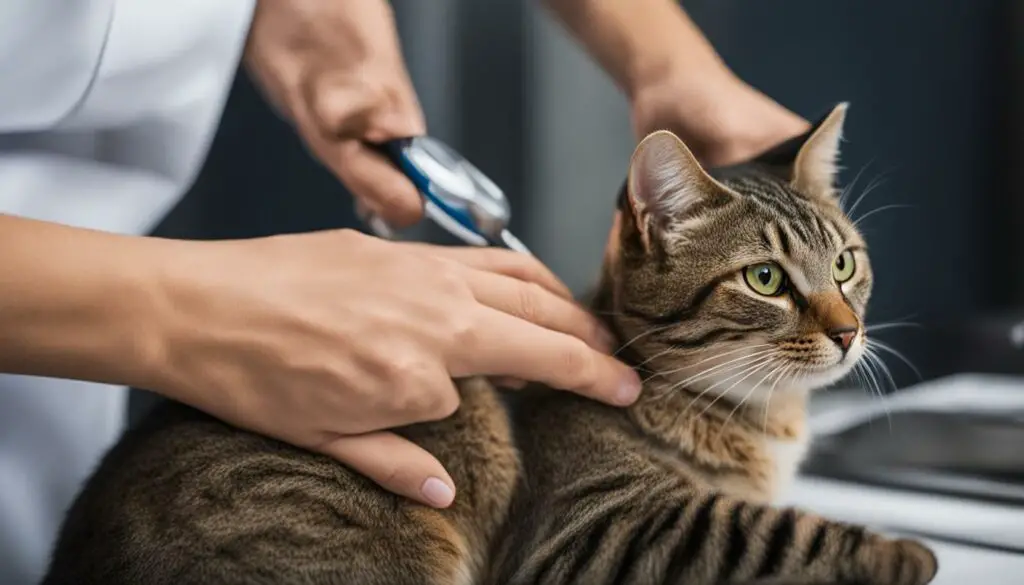
Conclusion
In conclusion, it is important for cat owners to be mindful of the potential risks associated with giving their cats treats, including Temptations cat treats. While these treats can be a tasty incentive, there have been reports of cats experiencing vomiting after consuming them. Excessive consumption of cat treats, including Temptations, can lead to digestive issues and other health complications in cats.
It is crucial to prioritize a balanced diet for your cat, focusing on their nutritional needs as obligate carnivores. While treats can be given in moderation, it is best to limit their daily intake to no more than 10% of their calorie requirement. This helps prevent problems such as obesity and nutrient imbalances.
If you have concerns about your cat’s reaction to treats or their overall digestive health, it is always recommended to consult a veterinarian. They can provide personalized advice based on your cat’s specific needs and offer guidance on safe treat options. A veterinarian’s expertise is invaluable when it comes to ensuring the well-being of your beloved feline friend.
Remember, while treats can be a delightful addition to your cat’s routine, their health should always be the top priority. By being cautious and informed about the potential risks of certain treats, you can help keep your cat happy and healthy for years to come.
FAQ
Are Temptations cat treats causing cats to vomit?
Some cats have reported adverse reactions to Pounce, a popular brand of cat treats, including vomiting. This raises concerns about the safety of Temptations cat treats and their potential to cause digestive issues in cats.
Are cat treats beneficial or harmful for cats?
There is some debate over this topic. While treats can be a tasty incentive for good behavior, some believe that they can contribute to weight gain and allergic reactions in cats. It is important to consider the ingredients in cat treats and their potential impact on a cat’s digestive system.
Can excessive consumption of cat treats cause digestive problems?
Yes, overfeeding cats with treats can lead to obesity, which can have various health implications, including digestive problems. Excessive consumption of cat treats can also result in vomiting and nutrient imbalances in a cat’s regular diet.
Is it okay to give my cat treats every day?
It is generally recommended to limit the daily intake of cat treats to no more than 10% of their daily calorie requirement. Feeding treats every day in moderation can be a part of a healthy routine for cats, but excessive treat consumption can lead to health issues such as obesity and nutritional imbalances.
How many Temptations treats should I give my cat a day?
The amount of Temptations treats to give a cat depends on their body weight. It is generally advised to provide up to 15 treats per 10 pounds (4.5 kg) of body weight per day. However, excessive consumption of Temptations treats can lead to digestive issues in cats.
Can cats eat tortilla chips?
No, tortilla chips and other human snacks are not recommended for cats as they can cause digestive issues, including vomiting. Cats have different nutritional needs and may react negatively to the ingredients in human food, such as the salt and additives found in tortilla chips.
What is a cat’s dietary needs?
Cats are obligate carnivores, meaning they require a diet primarily consisting of animal-based proteins. Their nutritional needs differ from humans, and it is important to provide them with a balanced diet that meets their carnivorous nature.
Why are tortilla chips unsafe for cats?
Tortilla chips are primarily made of corn, oil, and seasonings. The corn ingredient can be challenging for cats to digest, and the high salt content and potential digestive challenges associated with tortilla chips can lead to vomiting and other health complications.
How should I introduce tortilla chips to my cat?
It is not recommended to introduce tortilla chips or any other human food to your cat. Cats have specific dietary needs, and introducing unfamiliar foods can lead to digestive problems and potential health issues. It is best to consult a veterinarian for guidance on safe treats for your cat.
Should I consult a veterinarian regarding my cat’s diet and treats?
Yes, when it comes to your cat’s health, consulting a veterinarian is crucial. They can provide personalized advice based on your cat’s health status, dietary needs, and potential sensitivities. A veterinarian can offer guidance on safe cat treats and help address any concerns about vomiting or digestive issues related to cat treat consumption.

